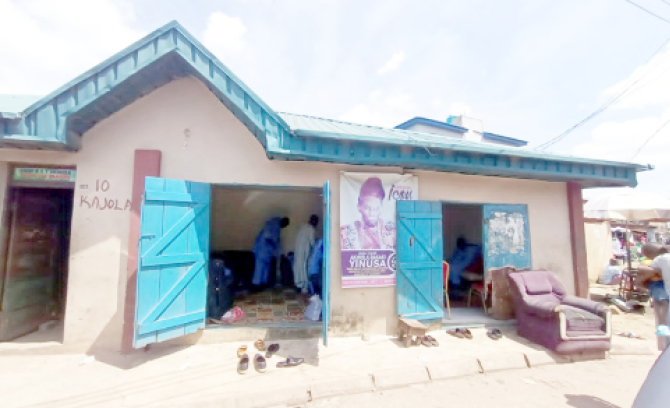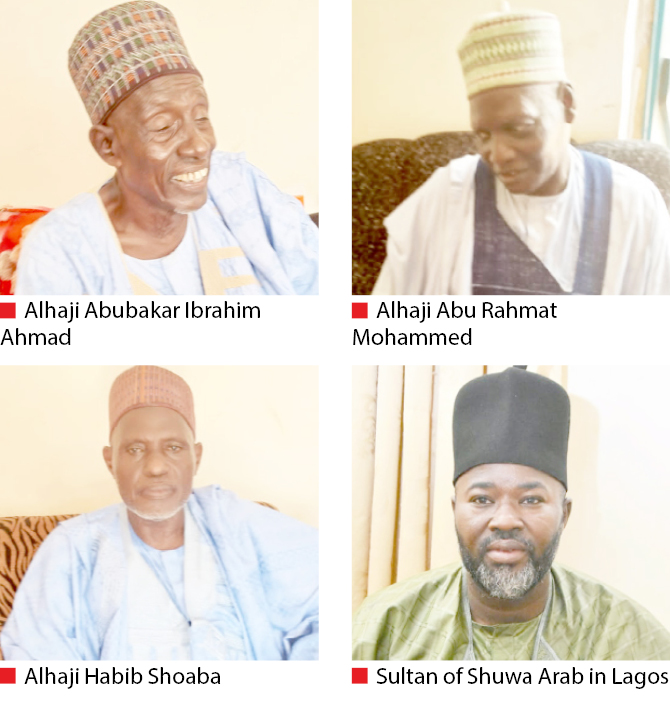Shuwa Arab is a distinct tribal group from the Arabian Peninsula, which settled in the Kanem Borno Empire as far back as the 14th century, from where they moved to all parts of the state. Today, the Shuwas as they are popularly called, have their presence in Lagos, particularly at Lagos Island. Daily Trust Saturday spotlights their migration to Lagos.
In Lagos State, the Shuwa Arab community is large, ubiquitous and very diverse. Daily Trust Saturday met some of their leaders to talk about their sojourn in the state, which they now see as their home. They confessed that migrating to Lagos over a century ago is not regretted.
Just after Onigbongbo Central Mosque at Maryland in Lagos is a mini palace of the Sultan of Shuwa Arab in the state. The palace may be too small in size, it is rich in history, which probably explains why it has remained as it.
Inside the palace were about five of the leaders of the Shuwa Arab sipping their tea with excitement in their faces as they welcomed Daily Trust Saturday into the palace.
- Service chiefs vow maximum force against terrorists, bandits
- We must recover govt’ stolen assets, Alia tells committee
It was a very hot afternoon, and despite the scorching sun of the day, our correspondents met them in the palace sipping very hot tea, popularly called shayi in Hausa dialect. It was clear that they are synonymous with shayi and it has become a way of life.
Shuwa Arab are spread across Central and West Africa. In Nigeria, they are predominantly in Borno and Yobe states.
The Shuwa Arabs are commonly referred to as the “Baggara.” This name is derived from the Arabic word bagar, meaning “cow,” and refers to the Arab tribes in West Africa who are cattle herders.
They are also found in the northeastern part of Nigeria and other places in large numbers.
From Maryland to Surulere, Ojo, Epe, Lekki, Badagry, Agege, Ajegunle, Shomolu, Ikorodu, Mile 12, Idi-Araba, Apapa and Amuwo-Odofin, the Shuwa Arab people have found a home in Lagos and they have become part and parcel of the Lagos community.
With over two million Nigerians of Shuwa Arab descent in Lagos, according to their leaders, they are now a major community to reckon with in the state after over 100 years of sojourn for businesses.
Led by the Sultan of Shuwa Arab in Lagos, appointed by the Shehu of Borno, the Shuwa Arab people are now mostly into cattle business and private residential guards in different parts of the state, apart from other menial jobs.

How they settled in Lagos
Several accounts from leaders of the tribe revealed that members of the Shuwa Arab arrived in Lagos over 100 years ago as cow dealers. At that time, they first settled in Agege, which is a major Hausa community in Lagos. The mixture with the Hausa community has made it difficult for them to be recognised as a distinct community, but they are collectively referred to as the Arewa people.
While they are united, mostly by religion, which is Islam, they have distinct tribes and languages. Because members of the Shuwa Arab tribe speak Hausa language, they have been largely mistaken to be of Hausa descent.
Alhaji Habib Shoaba is one of the leaders of Shuwa Arab in Lagos who spoke with Daily Trust Saturday correspondents at his palace and recently recalled that he arrived in Lagos on February 12, 1955 as a cow dealer like his forefathers.
Shoaba, who listed several past sultans (leaders) of the tribe in Lagos, said all of them were cow dealers before the people started venturing into other ventures.
He said, “All of them came to Lagos as cow dealers. The first sultan, who reigned during the colonial rule, was Abba Shagafa. After him, we have had other leaders like Muhammad Umar, Jibrin Yahaya, among others, who all reigned at Maryland.
“They first arrived in Agege as cow dealers, settled there because of its closeness to Kara market in Ogun State, along the Lagos-Ibadan expressway. After that, they scattered. Some of them are in Maryland, Ikeja, Obalende. Now, go to Ajah, Epe and Amuwo-Odofin, they are there in large numbers or Badagry Local Government.
“We are Kanuri by tribe but we are Arabs. We have one thing in common with the Arab. We have lineage in Arab countries like Saudi, Yemen, Libya, among others, though we are largely from Maiduguri, the Borno State capital, which has about six local governments populated by the Shuwa Arab. These include Bama, Dikwa, Mafa, Gere, Damboa, Gere, among others.”
He said many of them now send their children to school to acquire western education, and on the basis of that, the tribe has produced many learned people who have occupied key positions in the country.
In Lagos, findings by our correspondents also indicate that many residential apartments are populated by members of Shuwa Arab, who are into security work as private guards, though many might not know their real identity as they are generally referred to as Hausa.
Shoaba said many people had realised that the Shuwa Arab were honest, peace-loving and trustworthy, adding, “This is why they can easily entrust us with their properties. This is not a coincidence. You see, many of our people are working as private guards in Lekki, Ikeja GRA, Omole and several places because people have come to trust and believe in our honesty. An average Shuwa Arab doesn’t steal or fight. We are generally peace-loving.”
He said the appointment of a Sultan in Lagos was aimed at uniting all the members of the tribe in the state. The sultan is like the eyes and ears of the Shehu of Borno in Lagos. He serves as the liaison officer of the Shehu in Lagos. He is like an ambassador in Lagos.
“From time to time, the Sultan gives report to the Shehu of Borno about his domain, which is the whole Lagos. This is part of his responsibilities, which he has been discharging creditably, in addition to ensuring the welfare of our people.
“The Sultan is very committed to the welfare of our people and working tirelessly to keep peace among our Hausa-Fulani brothers, and by extension, the indigenous people, who are Yoruba,” he added.
Asked about a platform where the people of Shuwa Arab converge to discuss matters of interest, he said the Sultan has been able to decentralise the power and appointed leaders in many communities in the state, who brief him from time to time on developments in their domains.
According to him, they usually take advantage of events like marriage or naming ceremonies to gather their people. “For instance, we had a marriage over the weekend and more than 700 people attended. This is where you would see our culture in action.
“We have leaders of Shuwa Arab everywhere in Lagos, and when there are issues that threaten the peace of the community, they quickly resolve it. Many of our people are prominent Islamic clerics who are now recognised in Lagos,” he added.
Malam Shoaba said the people of Shuwa Arab, having contributed significantly to the socio-economic development of the state, should be given opportunities to excel in all endeavours.
“We want scholarship opportunities for our children. A lot of us are advocates of quality education. So we are pleading that our children should be considered in any scholarship opportunity available in order to have a sense of belonging,” he said.
On his part, another leader who was in the palace when our correspondents visited, Abubakar Ibrahim Ahmad said, “Shuwa Arab people are playing a vital role in the security, wellbeing and peaceful coexistence in the state.
“We have been participating actively in the various elections in the state, including that of President Bola Ahmed Tinubu, starting from when he was elected governor in 1999.
“The present Sultan is doing a lot to bring everybody together and foster a peaceful relationship with other members of the Arewa community, especially the Hausa. We now see ourselves as one, bound together by the same reason of coming to Lagos in search of greener pastures.”
He said that in plying their trades in Lagos, they were conscious of the need to respect the laws of the land and make peace with the host community.
“This is what we have preached and emphasised with our people. And we have been living peacefully with our people,” he added.
He also disclosed that Shuwa Arabs were not involved in the age-long farmers-herders crisis because they were not in the business of rearing cows but trading in cattle.
“We don’t move around with cows like Fulani herders, we only sell,” he said.
Abu Rahmat Mohammed, a retired military officer who disclosed that he migrated to Lagos in 1976, reiterated that the Shuwa Arabs, over the years, had transcended beyond cow merchants to establish their presence in public and private sectors after embracing western education.
He said, “We have been able to mingle with the Yoruba community. And our people are now into other things, apart from selling cows. This was made possible by the cordial relationship we have built over the years. We didn’t migrate here to become a burden on the state, we are also contributing to its economy through the payment of taxes to the government.”
The Sultan, Alhaji Umar Muhammed Ahmed Gulumba, confirmed to our correspondent on phone that his people did not embrace western education at the early stage but added that they are now doing everything possible to ensure that their children are well educated.
He said, “When I assumed duty as the Sultan of Shuwa Arab, I made sure that the enrollment of our youths in tertiary institutions increased. I have sponsored more than 20 students who are studying in various universities. We are also looking into how we can diversify our economy.
“Shuwa Arabs were known as cattle merchants as it was the business that brought our forefathers to Lagos during the colonial era. Apart from cattle business, our people are also into security services. We are popular in this sector due to our honesty, contentment and bravery. We provide security services for companies and individuals around Lagos.”
He disclosed that they settled in areas like Maryland, Agege, Idi-Araba, Apapa before Nigeria’s independence, but have now spread to almost every part of the state, with highest concentration in Lagos Island areas like Victoria Island, Lekki, Ajah, amongst others.
He said the first Sultan of the Shuwa Arab of Lagos, Abba Shagafa, was crowned over 100 years ago. His palace was at Onigbongbo, Maryland. “It is the same palace we are using till date. I am the 8th Sultan in Lagos. I was crowned by the present Shehu of Borno on March 11,” he said.

 Join Daily Trust WhatsApp Community For Quick Access To News and Happenings Around You.
Join Daily Trust WhatsApp Community For Quick Access To News and Happenings Around You.


